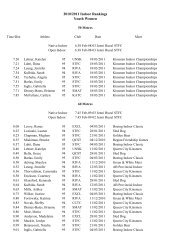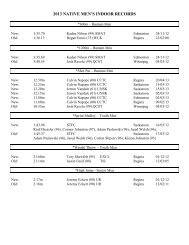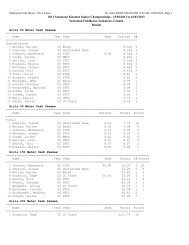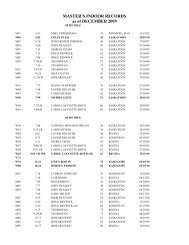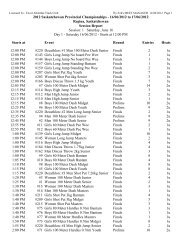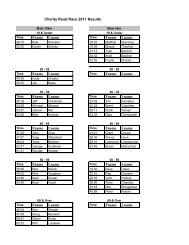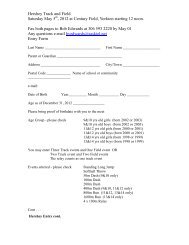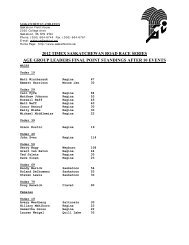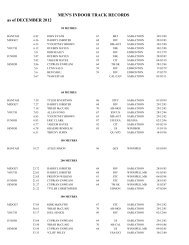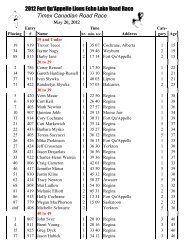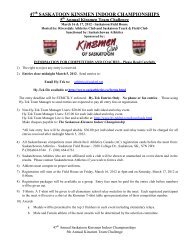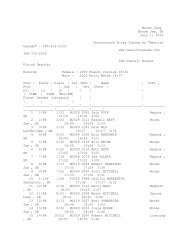2008 Substance Classification Booklet - SIRC
2008 Substance Classification Booklet - SIRC
2008 Substance Classification Booklet - SIRC
You also want an ePaper? Increase the reach of your titles
YUMPU automatically turns print PDFs into web optimized ePapers that Google loves.
<strong>Substance</strong> <strong>Classification</strong> <strong>Booklet</strong>– <strong>2008</strong><br />
Supplements<br />
5.0 Supplements<br />
Canadian athletes are looking to the Canadian Centre for Ethics in Sport (CCES) and other sport<br />
authorities to provide them with advice concerning supplement products. Their main interest is<br />
avoiding an inadvertent anti-doping rule violation. They also want assurances that supplements<br />
are safe, effective, and present no risks associated with mislabeling and contamination.<br />
Athletes must understand that this advice cannot eliminate the risk of inadvertent doping; instead,<br />
it is aimed at increasing the athlete’s awareness about supplements and reducing the risks of<br />
doping associated with supplements. At present, there are too many uncertainties for the CCES to<br />
guarantee the status or purity of any supplement products.<br />
Under the principle of strict liability, athletes are ultimately responsible for all substances found<br />
in their bodies.<br />
CCES / CANADIAN OLYMPIC COMMITTEE / CANADIAN PARALYMIC COMMITTEE<br />
ADVICE ON SUPPLEMENT USE<br />
1. Always seek professional advice before using a supplement. Team physicians and sport<br />
nutritionists are excellent resources and can be contacted through your sport organization or<br />
Canadian Sport Centre. If these professionals are not available to you, you should seek advice<br />
from a pharmacist. Always make sure the professional knows of the risks associated with<br />
supplement use and reviews the World Anti-Doping Agency (WADA) Prohibited List before<br />
providing advice.<br />
2. Consider whether you need to use a supplement by determining if you have other options,<br />
such as changes to your diet or nutrition program.<br />
3. Never use a supplement just because a teammate or competitor is using it or recommends it.<br />
4. Don't start or change a supplement regime in the run-up to a major competition unless you’ve<br />
consulted with a professional.<br />
5. Supplements fall into a wide spectrum of types with the level of risk being lower at one end<br />
of the spectrum and higher at the other. Vitamins and minerals usually warrant less concern<br />
than those products that rely on claims related to performance benefits (e.g., muscle building,<br />
fat burning.) Examples of substances that are prohibited and may appear in supplements from<br />
time to time are: DHEA, Ephedrine, Androstenedione/diol, Amphetamines, and Ma Huang.<br />
6. There is always an increased risk of doping when supplements are purchased through nontraditional<br />
means such as: over the internet, through magazines or directly from a nonlicensed<br />
supplier. Products purchased from a trusted retailer or directly from a reputable<br />
manufacturer are likely to be associated with lower risk of inadvertent doping. If possible,<br />
determine if the manufacturer produces any products containing substances from the WADA<br />
Prohibited List – if so, there will be a higher risk of cross-contamination between products.<br />
Given a choice of suppliers, choose a product from a company that also manufactures<br />
pharmaceuticals over one that is unknown.<br />
7. Always follow the recommended dosage and route of administration as indicated on the<br />
product label. Be especially cautious of potential negative interactions if consuming more<br />
than one supplement product at a time. Use supplement products like you would any overthe-counter<br />
medication - for example, if the recommended dose is one tablet, two or more<br />
may be unhelpful, counter-productive or even dangerous.<br />
8. Keep a log of your supplement use (like your training log), including the batch or lot numbers<br />
of the product and when they were consumed. Always keep some of the contents from each<br />
container of supplements in case a problem arises that requires the product to be investigated.<br />
Search the Global Drug Information Database at<br />
www.didglobal.com 43



